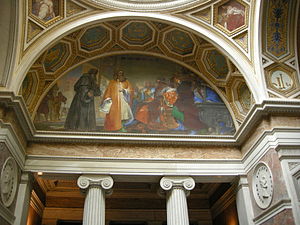Nicola Cianfanelli
This article needs additional citations for verification. (August 2013) |

Niccola Cianfanelli (July 19, 1793, in Moscow – August 30, 1848, in Florence) was an Italian painter and restorer. He mainly painted historic and sacred subjects in a Neoclassical style.
He studied under Pietro Benvenuti at the Academy of Fine Arts in Florence. Among his works was the fresco of Ercole and Jole in the salon of the Palazzo Borghese in Florence. He painted the sipario theater curtain of the Niccolini Theater in Florence with a depiction of a passage from the poetry of Pulci, La giostra di Lorenzo il Magnifico col Borromeo sulla piazza di Santa Croce. He painted an oil canvas depicting the Adoration of the Magi for the church of Santa Felicita in Florence. He frescoed scenes from I Promessi Sposi for the walls of a room in the royal palace (Palazzina della Meridiana di Boboli) in Florence.
He was commissioned to complete lunettes for the Tribune of Galileo (built in 1841 at present site of La Specola Museum): he completed Leonardo presents mathematician Luca Pacioli to Lodovico il Moro, but left the other lunette as a study with Volta experiments his discovery of the battery to Napoleon.[1] In Genoa, he painted frescoes of the Martyrdom of San Giacomo in the apse, and a canvas depicting, Massacre of the Innocents, for the church of San Giacomo. He also painted for Villa Puccini in Pistoia: Cellini presents to Cosimo I and Eleonora of Toledo the model of Perseus.[2][3]
References
[edit]- ^ The Volta lunette was completed by Gasparo Martellini.
- ^ Saltini, Guglielmo Enrico (1862). Le Arti Belle in Toscana da Mezzo il Secolo VIII ai di Nostri, Memoria Storica.. Florence, Italy: Tipografia Le Monnier. pp. 54–55.
- ^ Garollo, Gottardo (1907). Ulrico Hoepli (ed.). Dizionario biografico universale. Editore Libraio della Real Casa, Milan. p. 530.
